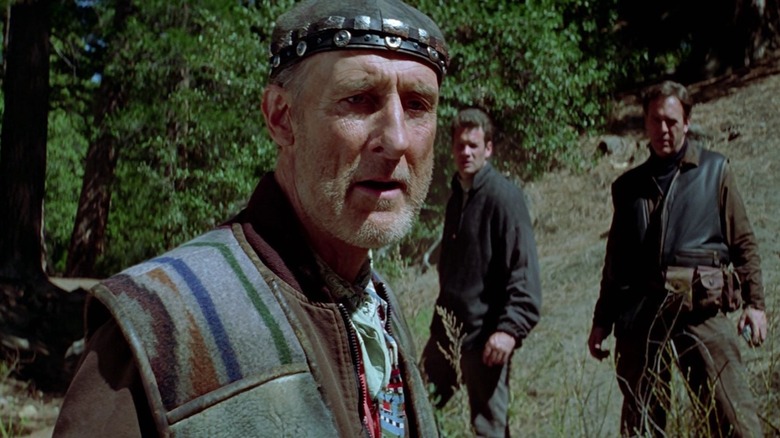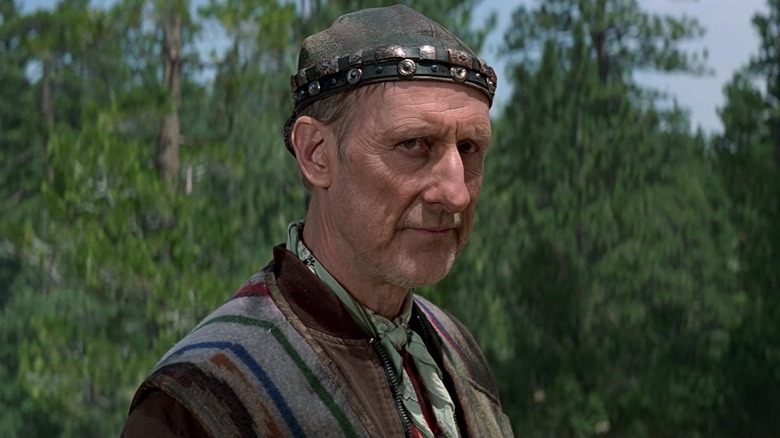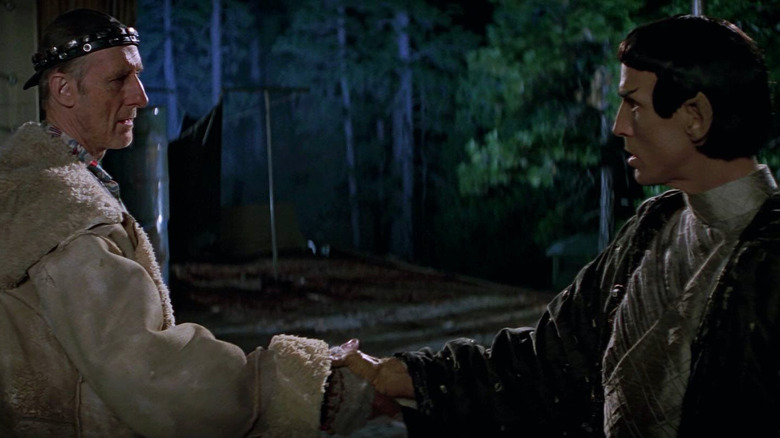How Star Trek: First Contact Found A Replacement For Glenn Corbett's Zefram Cochrane
In Jonathan Frakes' 1996 film "Star Trek: First Contact," the U.S.S. Enterprise travels back in time to the year 2063, the year humanity first invented faster-than-light travel and, almost immediately thereafter, made first contact with an alien species. By "Star Trek" lore, the maiden voyage of the Phoenix, the very first warp-capable ship, caught the attention of a passing Vulcan vessel, causing them to change course, land on Earth, and shake hands with humans. It was the franchise's "Welcome to the neighborhood" moment. It also started a massive utopian rebuilding of Earth, as it had just survived several devastating wars. By "Star Trek" creator Gene Roddenberry's estimation, Earth had to almost destroy itself to have a "moment of clarity." After that, the technological, post-war, post-scarcity, post-capitalist utopia could begin.
The inventor of warp drive was Zefram Cochrane, who fashioned his ship out of a disused bomb casing. In "First Contact," Cochrane was portrayed by James Cromwell as an irascible drunk who only aims to invent warp engines as a way of making money and retiring to a remote island filled with naked women. He's a humorous figure who, after talking to the Enterprise crew from the future, appreciates the magnitude of his discovery.
"First Contact" was not the first time Cochrane appeared on "Star Trek." In the original series episode "Metamorphosis" (November 10, 1967), the character was unexpectedly discovered on a distant planet, somehow alive a century after he would have died of old age. It seems he was granted eternal life by an ineffable energy being. In "Metamorphosis," Cochrane was played by Glenn Corbett.
According to a 2021 article by The Hollywood Reporter, the makers of "First Contact" needed someone very unlike the matinee-idol-handsome Corbett, as this Cochrane was going to be unrefined and unenlightened. Cromwell was their man.
Post-Babe territory
Initially, the casting directors floated some of their dream actors for Cochrane, including Tom Hanks. Hanks had just won Oscars for "Philadelphia" and "Forrest Gump," so he would have been an expensive name to land for a "Star Trek" movie, but producer Ron D. Moore liked the dream. Sadly, he admitted:
"It never got that far. [...] At that point in the process, there are lots of names on a wishlist for many, many reasons. I'm sure his name was floated in some capacity, but it was never really on the table."
Hanks would likely have played the part well, but Cromwell made it his own. And while Hanks may have been too "big" at the time, the filmmakers ran into a similar production snag with Cromwell. According to a 1996 episode of "HBO First Look," Cromwell was the preferred actor from the start, as he had already appeared in a few episodes of "Star Trek: The Next Generation" (notably "The Hunted" and the two-part episode "Birthright"). When Cromwell suddenly netted an Oscar nomination for the 1995 film "Babe," producer Rick Berman became fearful that their now-even-more-famous actor would drop out. Berman explained:
"When we were creating the character, we always had Jamie in our head. And then 'Babe' came along and all of a sudden he was nominated for an Academy Award and we thought, 'Oh my God, we're not gonna get him! He's too big for us now.' But because we had worked with him on a number of occasions, we were delighted that he did in fact take the role."
Cromwell would return to play Cochrane in an episode of "Star Trek: Enterprise" and as a hologram in "Star Trek: Lower Decks." He was part of the family in perpetuity.
The arc of Cochran
According to the oral history book "The Fifty-Year Mission: The Next 25 Years: From The Next Generation to J. J. Abrams," edited by Mark A. Altman and Edward Gross, Cromwell was selected specifically because he didn't have the same matinee idol good looks as Glenn Corbett. Berman noted that "Star Trek: First Contact" took place in the past, long before Earth had built its utopia, and felt that Zefram Cochrane should be equally unformed. In his own words:
"We had to go back and find a Cochrane who wasn't much of an admirable character to begin with, and who had lost any of what he had when the Borg started blowing up his ship. We had to get him back on track a little bit and help lead him in the direction we knew that history had meant for him to go."
The plot of "First Contact" also involved a malevolent species of cyborgs called the Borg, who had traveled to 2063 to assimilate humans into their machine collective. When the Borg attacks the un-launched Phoenix, the Enterprise crewmembers from the future have to help Cochrane rebuild the vessel in time for it to launch, and to be seen by passing Vulcans, due in our solar system in only a few more days.
Needless to say, the Enterprise defeats the Borg, the Phoenix launches, and our utopian future is secured. "Star Trek: First Contact," despite skewing toward action shlock, is still often considered the best film to have been based on "Star Trek: The Next Generation."


